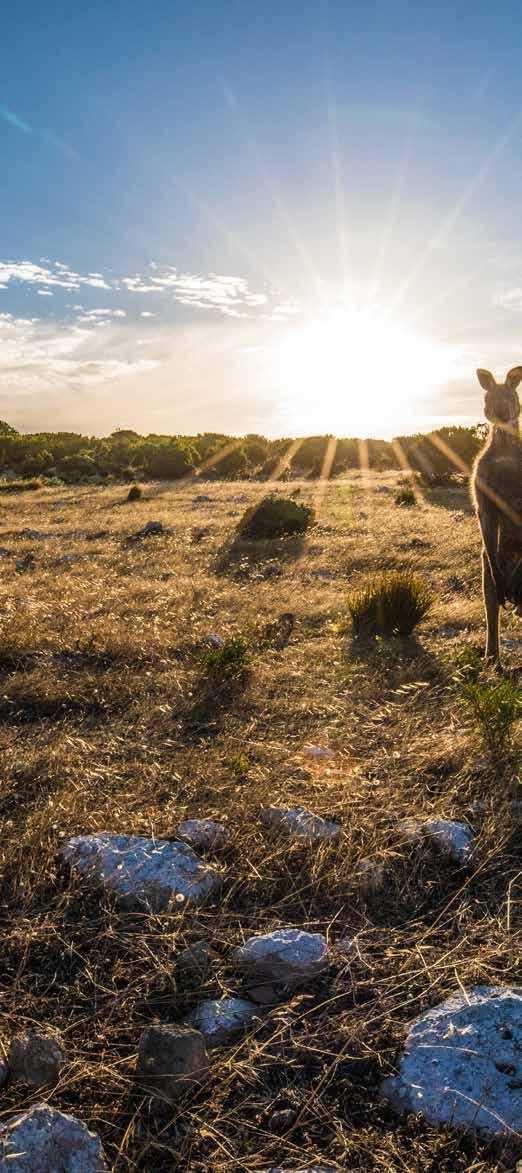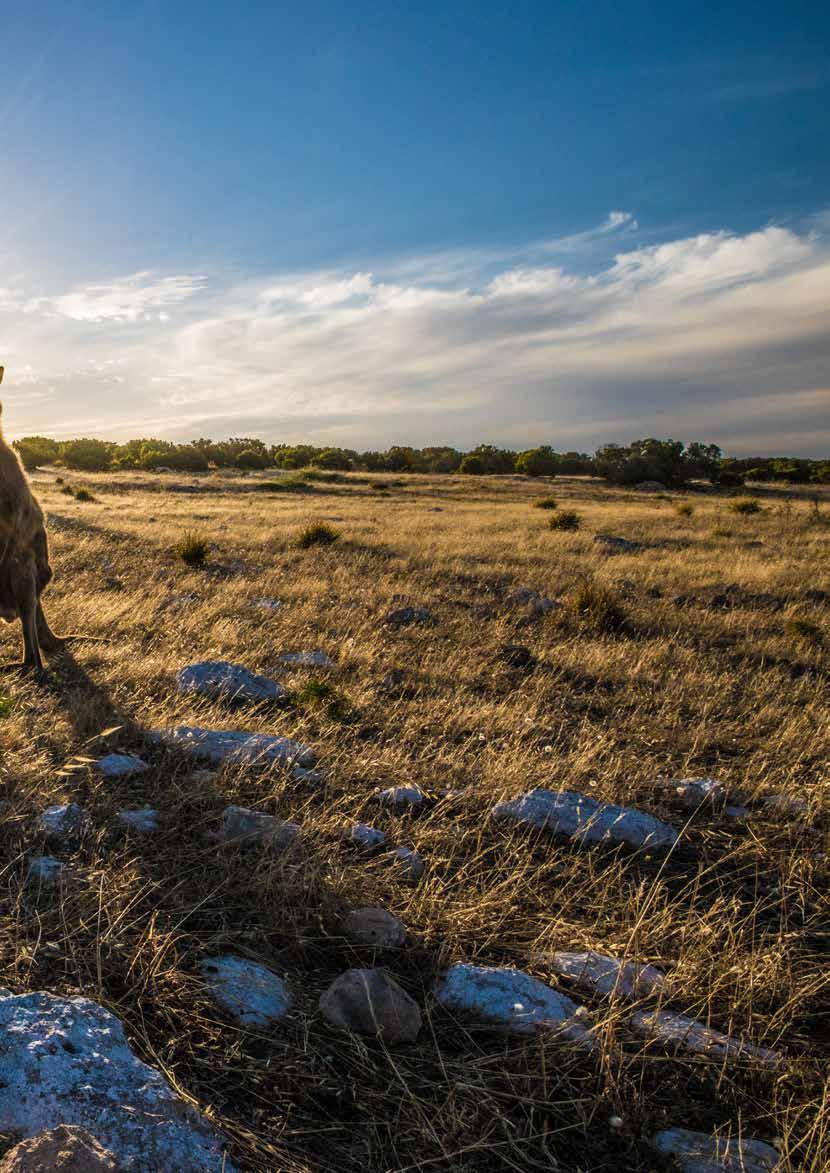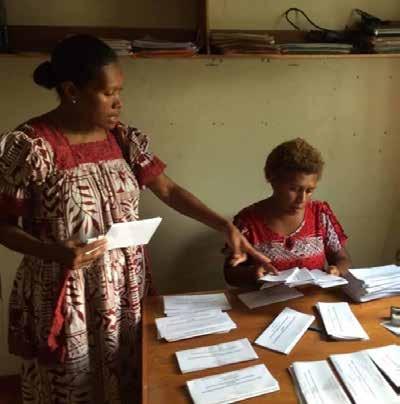
19 minute read
AUSWIDE
from IE #2 2020
by IEU NSW/ACT
Editorial After what has been a challenging few months, the IEU wants to personally thank every member for their extraordinary contribution and dedication to maintaining quality education throughout the COVID-19 pandemic.
The challenges members have faced have been unprecedented but have been met with determination and a collective resolve to provide our students with the best learning outcomes possible.
Advertisement
Throughout this time, the IEU and its branches have continued to advocate for members – whether in relation to protecting vulnerable workers, ensuring schools meet critical health and safety provisions or representing members in the midst of unjustified stand downs by their employers.
Collectively we have faced a great challenge and it is our solidarity that will continue to take us forward as we tackle the ongoing issues COVID-19 will present for our school communities.
As we move back into a more “normal” way of working, we present to you a monumental edition of Independent Education that focuses on what makes our union strong – you.
We start with the launch of ‘inFOCUS’ (p6) – a section dedicated to highlighting outstanding members of our education and union communities. Neselinda Meta has been strongly tied to the IEU for many years as she’s progressed through union leadership positions, now the President of the Council of Pacific Unions (COPE).
We feature contributions from IEU members and officers in ‘Learning Curve’ (p9) and ‘Maslow before Bloom’ (p20).
We put a spotlight on the achievements of IEU members in ‘Lab technicians enliven science’ (p22), ‘Strong Women: Our professional and industrial history’ (p28) and ‘Carmen makes outstanding contribution as teacher and leader’ (p30).
‘An environment of solidarity’ (p24) gives a comprehensive account of the union movement, climate change and environmental degradation, as we mourn the passing of staunch union leader and environmental activist Jack Mundey.
I also commend the work of our IE journalists who have explored professional issues with industry experts on pages 10, 14, 18, 24 and 35.
Victoria Challenges of 2020 deliver registration flexibility
In these unprecedented times, IEU members in Victoria expressed anxiety about the possibility of not being able to meet key requirements for registration due to disrupted employment and/or remote learning constraints over the period of students learning remotely. As Victorian registered teachers would be aware, the requirements for annual renewal for fully registered teachers include 20 days of practice and 20 hours of professional learning activity over the 12 month period from 1 October 2019 until 30 September 2020. With a registration renewal date earlier than most other states, disruptions covering months can have a negative impact. For Victorian Institute of Teaching (VIT) Provisionally Registered Teachers who are granted this initial form of registration for two years, the disruptions due to COVID-19 could mean that a significant number may not have completed either the required 80 days of teaching and/or the evidencebased process necessary for applying for full registration. A substantial number of provisionally registered teachers work as casual/emergency teachers in their first and sometimes second year, so they can be particularly impacted by disrupted work.
The IEU has raised these issues with the VIT, and reassuringly, registered teachers recently received an update from the Institute explaining how all of the above registration issues can be accommodated. In essence, this year no teacher will be precluded from being able to renew their register or having their provisional registration period extended due to these COVID-19 related challenges.
Tasmania COVID-19 causes pause
The Tasmanian Department of Education advised all Tasmanian schools in April of postponement to the Years 9 to 12 Curriculum Framework project, the draft Vocational Learning in Tasmanian Schools Framework and draft Requirements and Guidelines on the delivery of VET in schools.
The Years 9 to 12 Project Steering Committee met in late March and discussed ways forward given the change in priorities, resources and staffing associated with COVID-19. The Department determined that the health and wellbeing of students and staff was felt to be a key priority at this time, which has led the Steering Committee to decide to pause external consultation for the Years 9 to 12 Project until further notice.
The Department advised that the key implication of this pause is to provide new courses using the Years 9 to 12 Curriculum Framework. It outlined that: • the priority is to ensure a full curriculum for Years 11 and 12 in 2021 • Australian Curriculum offerings for Years 9 and 10 will remain unchanged • new courses using the Years 9 to 12 Curriculum Framework will not be developed and delivered in 2021 • a consideration of when new courses may be developed will need to occur, but noting the dynamic nature of the COVID-19 situation, this will need to be assessed and determined as the situation unfolds.
Northern Territory Employer application dismissed by FWC
An employer application to terminate the existing Kormilda College collective agreement has been dismissed by the Fair Work Commission (FWC) after opposition from our union.
Kormilda College has been operating as Haileybury Rendall School (HRS) since 2018, following the sale of the school.
The existing Kormilda College collective agreement continues to provide coverage for former Kormilda staff employed by HRS.
Prior to the employer’s application to terminate the agreement, IEUA-QNT members in the Darwin school had been negotiating with the employer to replace the agreement.
Before negotiations were halted by the application from HRS to the commission, employees remained concerned about key employer claims, including: • an expectation to work additional ‘reasonable hours’ without defining what ‘reasonable hours’ are • compulsory participation in extracurricular activities for up to 40 hours per year • payment of wages and salaries monthly rather than fortnightly • the exclusion of some employees who have previously been covered by the agreement.
IEUA-QNT Organiser Jengis Osman said the decision was a welcome outcome for members and should allow bargaining with the employer to resume shortly. Osman said members had displayed resilience and persistence in challenging circumstances. Our union is seeking urgent resumption of negotiations with the employer to reach an in-principle agreement that can be put to ballot.
Queensland Union committed to new and updated agreements
Despite the challenges posed by COVID-19 in schools, our union remains committed to developing new and updated collective agreements.
While COVID-19 health and educational issues have led to delays in recent bargaining timeframes, current uncertainties mean we need collective agreement protections of our wages and conditions now more than ever.
Throughout early Term 2, the IEUA-QNT provided assistance to Catholic employers with the drafting of text for an agreement to go to ballot. At the time of writing, employers had committed to meeting with our union to progress the finalisation of the agreement.
IEUA-QNT also sought the urgent resumption of negotiations with Queensland Lutheran Education in May.
Members in Queensland Lutheran schools sent a clear message to their employer at the end of Term 1: “Return to the bargaining table without the agenda to cut, control and constrain conditions.”
A number of significant employee claims including workload interventions, school officer conditions, updated PAR arrangements and wage outcomes were outstanding.
IEUA-QNT chapters in Queensland Presbyterian and Methodist Schools Association (PMSA) schools finalised their bargaining claims in mid-May.
It is anticipated that initial bargaining meetings will be held with PMSA employer representatives later this term.
In the face of major disruption to the education sector, our union continues to fight for members’ rights while also supporting them through a period of substantial challenges.
South Australia Stand downs: too early, too deep and too brutal
Leading into Easter, many SA Catholic schools gave staff letters of full or partial stand down. The IEU is in dispute with the employers over the legitimacy of the stand downs, the lack of consultation over this major workplace change and the lack of recognition of notice and representation rights under the enterprise agreement. In essence, the Catholic employers have cut too early, too deeply and too brutally.
The schools had not suffered a “stoppage of work”; they simply feared a decrease of income due mainly to fee remissions. There was no genuine exploration of other ways to deploy affected staff. Generally, the imparting of news was not handled sensitively. Employees’ fates were in a sealed envelope handed to them just before the holidays. This has unsettled many members who have become distressed and anxious. Many see this as a rejection of their many years of dedicated service when they were simply told that their work is “not essential”.
With the high return rates for students in Term 2, most stand downs are being reversed quickly. This does not undo the psychological and financial damage done to employees.
Australian Capital Territory Members take action as employers stall
During Ramadan, the teachers at the Islamic School of Canberra took protected industrial action, stopping work for one hour, from 8.50 to 9.50am on 30 April to protest a protracted enterprise bargaining process.
Since 2016, the IEU and the School Board of the Islamic School of Canberra have been engaged in negotiations with no end in sight. This is the second time teachers at the school have applied to the Fair Work Commission to take protected industrial action.
Patient with their employer, teachers persevered through the school’s many challenges, including threatened deregistration, ongoing funding issues and a change of ownership. Until April 2019, teachers at the school had not received a pay rise in more than five years. They are now more than $10,000 a year behind colleagues in other NSW and ACT schools – a gap that is only growing.
“Staff employed at the school are an extremely dedicated group who have stuck it out for their students, the school and the wider community during a tough time,” said IEU Organiser Lyn Caton. “They are not making any ambit claims but merely trying to preserve their rights and entitlements and align their conditions with teachers throughout the ACT.”
These teachers are also experiencing diminution of their employment conditions. “The members have confirmed their concern and dissatisfaction by returning unanimous support for industrial action,” Caton said.

New South Wales Standing up to stand downs; pressing for pay rises
The rapidly evolving COVID-19 situation necessitated IEU members responding in creative and resilient ways, including meeting the challenges of remote teaching and learning. Union members in all non government education sectors stepped up to provide education and care to students and support to families whose lives and work had been severely disrupted. Principals, teachers in early childhood, primary and secondary schools and post secondary settings, counsellors, and support staff in many diverse roles, adapted to the challenges of working from home and/or their workplaces.
While negotiating for a safe return to school in Term 2, the IEU has focused on the health, safety and wellbeing of members, at the same time protecting their industrial rights under current agreements. The union successfully resisted stand downs and advocated for the interests of casual staff. It continues to insist teachers only teach via one mode of delivery at any one time.
While dealing with COVID-19 issues and implications, the union has also been advocating, via the Catholic Commission for Employment Relations (CCER) and the Association of Independent Schools (AIS), for Catholic and independent sector employers to continue negotiations for enterprise agreements. Unlike their government school colleagues, members in NSW Catholic systemic and Catholic independent schools are yet to receive a pay rise for 2020.
IEU members have been holding chapter meetings by phone or video conference and finding creative ways to engage collectively to ensure that their voices are heard.
Members have acted in solidarity to protect working conditions and promote safety at work. “We need to work flexibly and creatively and not throw out our hard-won protections – there has never been a better time to join the union,” one union member said.

Neselinda Meta
Recently elected as the President “The first years of teaching were of the Council of Pacific Education challenging as I was young and I (COPE), Neselinda Meta has questioned my decision making,” been a Building Our Leadership she said. Development (BOLD) union woman “However, it was good experience and passionate teacher for the past and I learned a lot. two decades, writes IE journalist “I am now experienced in the field Jessica Willis. with a lot of confidence within myself to
Neselinda is a classroom teacher and do my job well and to serve to the best deputy principal of a newly established of my ability for my students. primary school, of around 100 students, “I believe that teaching is a calling that in Vanuatu. gives great purpose to one’s life and it is
“I became a teacher because of my never the same one day to the next.” family background,” said Neselinda. Neselinda said one of the basic human
“My parents were both teachers and needs is belonging and, as a teacher, as the eldest child I was responsible for you experience a sense of belonging looking after my seven siblings. because you have a place to go every
“I also grew up in a village where day where you are needed and you pass I liked working with children, for on that feeling to your students. example, as a Sunday School teacher “It’s about building people and and doing activities such as camping helping them become more of what out with children. they are meant to be,” she said.
Neselinda remembers her first years “The relationships you develop as a of teaching as tough but foundational, teacher are absolutely amazing. You as she honed her professional are meeting people at a critical point in judgement and learnt how to work with their life and having a good chance to her colleagues. be part of their lives,” she said. 6 | independent education | issue 2 | Vol 50 | 2020
Of course, no matter where you are in the Pacific (or the world), the challenges of the teaching profession seem to be universal.
Neselinda believes the hardest part about teaching is making sure you establish good connections with your students, meeting and managing the demands and expectations of parents, and ensuring you are always a strong role model for your students.
Unionism in the Pacific
Neselinda joined her union, the Vanuatu Teachers’ Union (VTU), as soon as she graduated from teachers’ college and has remained a strong union activist since, focusing particularly on organising and facilitating women’s networks throughout Vanuatu and the Asia Pacific region.
“I first joined [my] union when I graduated from teachers’ college.
“The message around that time was that the union was a body who fought for teachers’ welfare which is why I
decided to sign up,” she said.
Being an active union member is important to Neselinda, as members are what ultimately give the collective strength in numbers, contribute to the broader education of workplace health and safety rights, further the quality of the teaching profession and provide more opportunity for training and professional development.
As part of the VTU, Neselinda has worked hard to help negotiate wage increases for teachers in Vanuatu, implement collective bargaining with the Teaching Service and Ministry of Education (of Vanuatu) and provide training to members.
Natural disaster and crisis aid
Another significant function of the VTU is to give advice and support to members during times of national crisis and natural disaster, to ensure the health and safety of educators, students and their communities.
Confronted by three major crises in 2020 so far (COVID-19, tropical cyclone Harold and a volcanic eruption) there has not only been significant disruption to education but extensive damage to homes, shelters and food and water sources.
Neselinda said the VTU was helping bring relief to members during and after these national crises through: distributing food, health and sanitary items including mosquito repellents and paracetamol drugs; and ensuring members on different islands are reached by hiring boats to distribute aid items and check on them.
Capacity building for women in the Pacific
Elected as Secretary of the VTU Women’s Network in 2009, Neselinda held this position for 10 years.
In 2015, Neselinda was awarded the COPE Alisi Fusi Wightman Scholarship for her work in ensuring that the women within the VTU, particularly those in outer regions, receive capacity building skills and rights knowledge through a dedicated schedule of training. Some of the activities Neselinda helped organise over this time included: • a 2014 workshop to broaden and strengthen unionism among women in the VTU women’s network and launch the Unite for the Quality of
Education for All campaign • a 2017 workshop on implementing the United Nations' Sustainable Development Goals though developing workplans • a 2018 food preservation workshop to further educate women on food preparation (a lack of fresh food became a reality for members after
the devastation of tropical cyclone
Pam in 2015 • professional development in 2018 on gendered violence; domestic violence is a big issue in Vanuatu and teachers are encouraged to address the issue from early schooling • professional development in 2019 on gender equity and education • ‘train the trainer’ sessions with union partners on working rights • projects and workshops to improve life skills such as sewing and financial literacy, encourage women’s participation in leadership decision making and meetings and strengthening network building • working with stakeholders on promoting climate change awareness and solutions.
These are significant achievements as the geography of Vanuatu makes it challenging logistically and financially for members to come together. It is through such activities, largely driven by Neselinda’s leadership, that the VTU Women’s Network has been empowered to campaign for change.
Education International and the Council of Pacific Education Unions
COPE is a registered organisation of education unions from the South Pacific and is a sub-branch of Education International’s (EI) Asian and Pacific Region Divisions.
It comprises education unions from Australia (IEU, AEU and National Tertiary Education Union), the Cook Islands, Fiji, Kiribati, New Zealand, Papua New Guinea, Samoa, the Solomon Islands, Tonga, Tuvalu, Vanuatu and Wallis and Futuna.
COPE hosts biennial conferences to address issues facing education in the South Pacific. In 2016, Neselinda was elected to the position of Women’s Network Coordinator in COPE and, unsurprisingly, took an active role in supporting the women's networks in other COPE affiliates across the Pacific.
Then, in 2017 she was elected to EI Asia Pacific Regional Committee and last year became President of the council.
“I’ve worked with COPE over the last three years as a Women’s Coordinator and now as the recently elected COPE President,” Neselinda said.
These leadership positions, she said, have shaped her to be transparent in decision making and trustworthy to her colleagues.
The experience has also taught her the true value of unions and how critical they are to ensuring members’ overall welfare.
“It was a great opportunity taking up these leadership positions because
I have gained a lot of experience and have learned a lot from these different roles.
“I believe I am where I am today because of the passion I have for my union and being a union member.
BOLD Woman
Not only has Neselinda worked tirelessly with women’s networks in Vanuatu and the Pacific region but with the IEU’s women’s network – BOLD (Building Our Leadership Development).
Last year, Neselinda was a special guest panellist at the IEU BOLD Women’s Conference (pictured opposite page), discussing strategies to encourage women into union work despite the pressures of traditional and cultural barriers.
Neselinda said that key cultural challenges for women in leadership include fighting gender stereotypes, juggling professional roles with parental and family/caring roles, being too cautious to take risks and questioning their own judgement.
“Supporting women’s leadership in unions and within the workplace, I believe, is a key to reduce poverty, promote economic growth and democracy as well as increase the wellbeing of women, girls and their families.
The Alisi Fusi Wightman Scholarship was created in honour of Alisi Fusi Wightman, a Vice-President of the Fijian Teachers’ Association, the only female leader at the time, and union leader during the 1970s and 1980s.
She had strong values and encouraged women in their union and teaching profession.
She was a pioneer unionist who developed the foundation of COPE.
The scholarship program is awarded to two female union activists in COPE and focuses on developing their union and professional skills to increase recipients’ knowledge and confidence.
The recipients spend one week in Australia meeting representatives of the Australian Education Union (AEU) and the IEUA, then a further week in New Zealand with the Post Primary Teachers’ Association (PPTA) and New Zealand Educational Institute (NZEI) Te Riu Roa.
Artwork created by Nicky Minus



“Despite these barriers, we women in our unions have to be strong and united and share ideas to build each other up, regardless of our different nationalities and cultures.
“We are the backbone of the working world. We must always think about how to start small and build our way up from there.”
She believes that within the next 10 years, Pacific education trade unions will be different as more women are willing and able to step up into leadership positions.
They are starting to be seen as important drivers in the unions of the Pacific.
“Women in leadership within unions and COPE are a big challenge because of our culture.
“As time passes women have begun to build themselves to become leaders through training and empowerment provided by COPE and other nongovernment organisations that work collectively with unions.
“It is a reality that cultural restraints can deny Pacific women their voice and undermine their confidence to stand up in public and fight for justice,” she said.
“But women are always concerned about the real facts of an issue and readily educate themselves to see things from different angles.
“Therefore, women are ready to target issues immediately once they gain a leadership position, that is why we need more women in leadership.
“It will make the difference that is needed,” Neselinda said.
Neselinda’s advice on taking up a leadership role: • Lead by example: leaders need to show not just tell. • A little humanity goes a long way – there is a difference between a leader and a boss. • Effective communication is important. • Know your limits. • Find a mentor.
BOLD IEU Women
The IEU’s BOLD Women’s Network was launched in 2017 at an inaugural conference which united 100 women from IEU branches across Australia.
Within the BOLD program women members are encouraged to become active in their union by networking with colleague members, attending professional development, connecting online and determining what their leadership development should look like.
To get involved in BOLD, members should contact their union branch.










